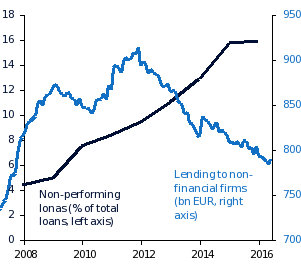The share prices of Italian banks collapsed following the UK’s decision to leave the European Union (EU). They are now trading more than 50% below their value at the beginning of 2016.While Brexit could be partially blamed, as it is expected to trigger global monetary easing which is typically bad for banks’ profitability, the problem runs a bit deeper. The balance sheet of Italian banks is loaded with bad loans. Attempts by the government to solve this problem by capitalising the banking system are running into legal hurdles imposed by new Euro Area rules. We expect Italy and the rest of the Euro Area to reach an agreement that is broadly consistent with rules. We do not foresee the trouble with Italian banks spilling over to the wider global economy.
Why are Italian banks in trouble? The main problem is the large stock of bad loans. Non-performing loans (NPLs) amount to nearly a fifth of the country’s GDP. The build-up of bad loans was mainly due to the weak performance of the overall economy. Italy was in a three-year recession between 2012 and 2014. The subsequent recovery was very weak, with the economy growing by only 0.8% in 2015. As a result, Italy’s per capita GDP is still below its pre-crisis peak, in contrast to most advanced economies. The weak macroeconomic environment has hurt many businesses resulting in a rapid rise of NPLs from 4.4% in 2007 to 16.0% in 2015, one of the highest ratios in Europe.
High NPLs have hit banks’ profitability. Italian banks recorded four successive years of losses between 2011 and 2014 and made meagre returns in 2015 (return on equity was only 3.1% in 2015). NPLs reduced income directly as borrowers failed to service their debt, and also indirectly as banks had to put capital aside to provision against losses on their troubled loans.
The impact of NPLs was not confined to the banking system but spread to the wider economy. High NPLs require more capital, imposed by the regulator. This would reduce banks’ ability to extend loans or engage in any lending activity that could potentially damage their balance sheet further. The loan book of Italian banks has been shrinking since the end of 2011, which has been detrimental to investment in the country, contributed to the recession of recent years and would hamper future economic growth.
Rising NPLs have depressed credit in Italy

Sources: Banca d'Italia, European Central Bank, Haver Analytics and QNB Economics
To solve the problem, the Italian government wants to inject capital to shore up banksand avoid the collapse of the banking sector. But the government is stuck between a rock and a hard place. On the one hand, new Euro Area regulations prevent governments from capitalising banks without imposing losses on banks’ creditors. On the other hand, it is politically unpopular to ‘bail in’ these creditors because nearly half are retail investors who are loath to enduring losses. When some Italian banks were bailed out under the new rules in November 2015, one retail bondholder committed suicide, causing a political outcry.
Italy is trying to negotiate with other Euro Area countries to relax these rules but it is receiving some resistance, particularly from Germany. This is understandable – the rules were agreed only recently and Italy represents their first potential application. Furthermore, there is a sound rationale behind them. They are set to prevent banking crises from morphing into fiscal crises as was the case in Ireland and Spain. In both countries, the cost of saving the banking system fell on the taxpayers whilecreditors of banks remained protected. However, Italy does represent a unique case in that bank creditors are largely retail customers, including many pensioners, not sophisticated institutional investors who are aware of the risks involved.
What is likely to happen in the future? Italy and the Euro Area would probably meet half way. The Italian government may be allowed to capitalise its banks and shield the retail bond investors to some degree. In return, the rules would continue to apply for larger institutional investors. The recent ruling of the European Court of Justice in the case of Slovenian banks that bailing in creditors was not a prerequisite for banks to receive aid from the state sets a positive precedent for Italy. Analysts are also discussing other possible legal loopholes which could resolve the conflict.
What does this whole episode mean for the global economy? It is unlikely that the problem of the Italian banks would turn into a global financial crisis like 2008. The key risk here is whether it would result in another popular backlash against the EU, this time from the region’s fourth largest economy. If it does, it could deal another blow to the European project, adding one more layer of uncertainty about the future of the EU on top of the UK’s decision to leave it. Neither the EU nor the global economy can handle so much resentment in so little time.
